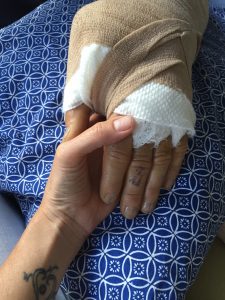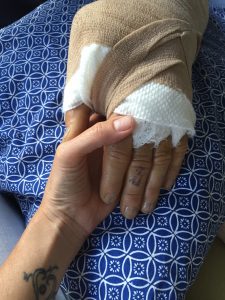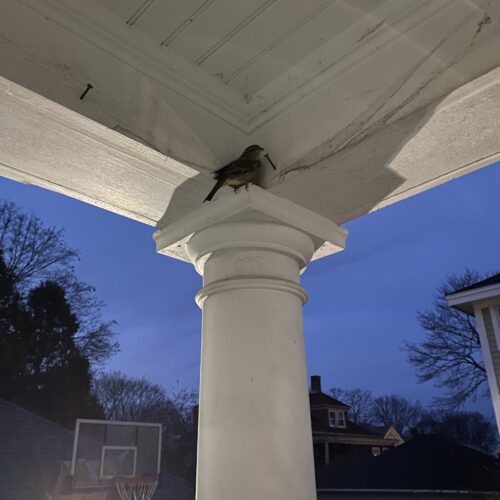 July was a bit of a train wreck for our family.
July was a bit of a train wreck for our family.
At first I thought it was just me, and I did my thing of quietly hunkering down to power through a rough patch that seemed to appear out of nowhere. But the more I talked about it with my friends, family and clients, the more I discovered I wasn’t alone in my experience of this month.
It seems an inordinate amount of people have had accidents, gotten sick, been diagnosed, or have had other sudden life-changing circumstances descend upon them in July. When I pulled back from my immediate environment, and looked at the larger context of the United States and recent world events, it felt like there was a heightened din of mayhem, violence, and dis-ease that was undeniable.
But this isn’t a post about that. There are plenty of wonderful people talking and writing about that beautifully.
No, this is post about how we CARE for each other in that context.
Because as I’ve heard how many of you out there got the call, heard the news, and had the shit hit the fan in your own lives last month as well, it has felt like we’re all – ready or not – getting a crash course in the need to care for each other.
In the midst of all this in my own life, what I became aware of is how woefully unprepared we are to do just that — myself included. We’re trained to qualify, put on rose-colored glasses, and pick ourselves by our bootstraps to make it all feel somehow neater. We’re not trained to be with the mess of it – to be with the unknown, the unanswered, and the tough emotions. We’re not trained in being to the degree we are with doing. This is not to say or suggest in any way that we don’t have the innate capacity to care — I believe in big hearts and best intentions — it’s just that our culture truly doesn’t really train us well in how to BE WITH each other in these ways.
And now more than ever, I believe the heart of our healing — how we give and receive help from one another — is about how we relate (or don’t relate) to each other in these places.
More than just muscle and brawn (broad shoulders and capable hands), what I’m pointing to — in myself and others — is our need for us to also care for each other with our hearts and our very presence.
Caring with our whole human beings, and not simply just our human doings.
I’m going to tell you a story of my most recent experience of this — mostly because writing about it (with you as my witness) is my primary way of figuring myself out. It seems that’s what writers do.
On July 5th, I got a call from my husband letting me know he had just broken his arm at work. “It’s really bad”, he said. I’ll spare you the details on exactly what happened, but let’s just say that was a gross understatement. That call from him began a three week shit storm, that ran the gamut from alarming to affirming, exhausting to inspiring, and painful to healing. It was — and to some degree still is — a time filled with lots of questions, very few answers, big stretches of waiting and seeing, huge learning curves, new systems to navigate, an alarming amount of “new normals”, and lots of emotional swamps to wade through with fear, pain, gratitude, vulnerability, guilt, self-consciousness, more gratitude, anger, reflection, and grace.
The bottomline (today’s) with regard to his injury is that he now has an external fixator (think Edward Scissorhands) holding his arm in traction for the next 8 weeks so the bones can heal appropriately. He apparently doesn’t have any nerve damage to his hand, but several fingers are still numb. “Clean and dry” are our operating instructions, as he will have five open wounds in his arm where the metal rods that are screwed into his bones come out of his skin. So yea… scary and now, somehow, normal. Beyond this phase, he’ll have another surgery to remove the device, and then will heal some more in a cast before engaging in lots and lots of physical therapy which will restore his left wrist to 50% functionality.
His goal is right now is to be able to carve the Thanksgiving turkey.
As I have been processing all that’s happened over the last month of our lives — and specifically my role in holding our family in a remotely upright position — I am keenly aware (and profoundly grateful for) the help we have been given. More to the point, I have made lots of mental notes about what worked, why it worked, and what didn’t work in receiving that help.
Because all this help we’ve received? It’s made a world of difference to us. It’s had us feel loved and held, safe and cared for, seen and validated. But there’s a real art to it, I’ve found. Sometimes help — even when offered with the best of intentions — doesn’t feel like help at all. It feels like more work and therefore burdensome. There have been some amazing shining examples of what I want to pay forward to others — as well as things I want to avoid because I know, firsthand, how they have felt to receive.
I want to pocket the learnings I’ve had from this time because they’re rich.
For starters, I have an even greater appreciation for caregivers and what they experience. Aside from the daily trials of parenting, my own experience of it has been brief and humble,. But the last month has given me a glimpse into this role a bit more. It has me thinking more compassionately about newly single parents, caregivers for chronic or terminally ill people, as well as partners to those in the merchant marines or the military who leave home for extended periods of time. Here are my top ten lessons from being a caregiver:
1. Communication becomes a full-time job. Immediately. And everybody, it seems, wants to hear directly from you. Group texts or emails with updates help, but they also set in motion days of follow-up with individuals as more information comes out and people ask to be kept in the loop. Oh, and the size of “the loop” grows exponentially daily.
2. The workload doubles (or quadruples) almost immediately as you learn for the first time all the things the other person had done that were invisible or you had taken for granted. In addition to this, each “new normal” arrives with another set of activities you never even thought to imagine, like bagging an arm before a shower or cleaning and sterilizing metal pins that stick out of an appendage.
3. Detailed, specific and very critical information and instruction hit you like a tsunami at the exact moment your ability to focus, comprehend and retain complex information reaches an all-time low because of stress and sleep deprivation. Simply put your attention span is nil and your memory is shit.
4. You move through your days coming into contact with other people’s grief, anxiety, and worry when your own load of it is already feeling more than you can bear. “Good” and “fine” feel like minimizing (or lying), while “not good” or “awful” feel alarming, so you learn to use neutral terms like “to be expected” or “day by day” so you don’t spend valuable energy soothing someone else.
5. You are forced to prioritize things that all seem equally important, like choosing between eating and a shower, paying bills or doing laundry, playing with a neglected kid or responding to a patient client, and getting sleep or catching up on work.
6. You feel like you can’t complain because it’s not you that’s hurt or sick or being brave. Period. And on a related note, it’s also hard to take time for yourself because you feel guilty or selfish – going for a run on a beautiful day when someone else has five metals bars sticking out their arm and is stuck inside just feels like rubbing salt in a wound.
7. You feel the need to start every sentence with “I’m sorry” or “thank you SO much” even though you know you don’t have to. You just are — sorry (for the inconvenience, the disappointment, the distraction) and grateful (for the help, the support, the understanding). AND eventually those two phrases start to feel shallow and insincere. Sadly, you also start to listen for them coming your way (like when the ungrateful cashier at the supermarket hands you a receipt for spending $275 on groceries with a “here ya go”).
8. People get really flustered when “strong” people break down, which often means they feel the need to rescue (You can handle this), reassure (You’re so strong) or point out all the silver-linings (It could have been much worse).
9. Sometimes touch is so much more affective than words. Eye contact. Someone touching their heart. A dry steady hand on your sweaty shaky one. A warm hand on the shoulder. A big bear hug. A rub on the knee. These all speak volumes.
10. Sometimes there is a weird pride and gratitude for the opportunity to help, like when you grill an amazing steak for the first time your 47 years, or you bring home the bacon AND fry it up in a pan, or when you get giddy at the chance to finally learn how to use a mower because someone else has always done it and now can’t.
But mostly, here’s what I learned as I’ve received helped from others:
Make a statement. Questions add to the noise.
How are you? How is he? How did it happen? What’s the latest? Do you need some help? What do you need? What can I do to help? How are you holding up? When can he return to work? What’s his pain like? How’s his arm healing? Are the meds helping? Do you need me to do something for you? How are you feeling? Are you okay? Is he okay? Anything I can do to help? All wonderfully loving, kind-hearted and generous questions. And…questions. Lots of them. Coming at us fast like one of those automatic tennis ball servers that has you running all over the court chasing them down.
These well-intentions questions are added to the mix of everyday questions that tend to swirl around us. What are we having for dinner? What does my work schedule look like today? Tomorrow? Next week? Who’s going to pick up the kids today? Where ARE the kids today? Where do they need to be tomorrow? Do we have food? Did we do the laundry? What bills are due? Did the dog get fed?
What happens next? Circuits overload. Texts, emails and phone calls go unanswered. Patience wears thin and guilt gets a foothold. An I don’t know stupor sets in, followed by an it doesn’t matter meltdown, which eventually leads to grid lock in the brain. And then you find yourself crying uncontrollably in the cereal aisle at the grocery store with complete strangers asking you if you’re okay. More questions.
What I’ve come to appreciate more fully through this experience is how very little we know about anything at any one moment in time. We just don’t. Which causes a great deal of anxiety for most of us. But when we were in the thick of it earlier this month, we got so overwhelmed and stressed out trying to address all the questions and options coming our way from the medical people, that we didn’t have anything left over to cope with anyone else’s questions. All those just sounded like noise, even as we knew they were well meaning.
What did cut through the noise, however, were the statements people made to us, whether in person or by text. I am keeping you in my thoughts and prayers. We’re sending you love – no need to get back to us, we just wanted you to know we’re here. We’ll be thinking about you tomorrow. Lit a candle for you today. I’m making you a meal next week. I’m stopping by to see you on Thursday – leave the door locked if you’re not up for it. I’m here if you need me.
Decisiveness is a tremendous gift.
When we were preparing for the labor of our first baby, our midwife gave my husband some sage advice. She said, “Don’t ask her if she’s thirsty, just stick the straw by her lips…if she’s thirsty, she’ll take it…if not, she’ll bat it away.”
Decisiveness can be a gift. Questions can distract those who are in pain — be it emotional, physical or mental. It feels counterintuitive and presumptuous to decide something for someone, but when someone’s world is saturated with unanswered questions, the biggest “help” you can give them is to not add to the pile. People who tell you they want to help and repeatedly ask you how they can do that are unwittingly adding to the burden of questions to answer — even when their intentions are good. They are adding their needs to the list the caregiver is inevitably carrying.
One of the biggest learnings I got from this whole experience was from those who were bold enough to just decide something for me. They didn’t ask me my opinion or consult me in advance. They didn’t ask my permission or have me weigh in on choices or options. They didn’t feel the need to coordinate logistics or be involved in any way. They just decided.
Like the friend who, upon finding out Todd’s surgery had been started and then aborted because of the rash they found under his cast, texted me to announce I’m bringing you dinner tonight. Or the friend who was with me at the hospital that has an amazing recollection of details who chose to call my parents for me without being asked simply because he knew they’d be anxious and would want an update. Or the family member who made it a point to plan a movie date and a beach day and a concert in the park with our youngest child because she knew we would be worried about him feeling anxious and neglected as we navigated this time.
Each time this happened — and there were many — my whole body sighed with relief when someone else took the reins and decided something for me. These people just made it so easy and simple for me to say yes to their help. They just stuck a straw near my mouth when I didn’t even know I was thirsty. And I sipped.
Meet people where they are, not where they might have been.
You’re lucky, it could have been his head that got crushed…or his leg. He could be paralyzed right now. You’re lucky he didn’t die. You’re lucky it happened at work. You’re lucky you have each other and you’re not single. You’re lucky you have flexible work. You’re lucky you have a supportive workplace. At least it’s not chronic or terminal. At least it wasn’t his dominant hand. It could have been much worse. Yes, all of that is true. And it’s not remotely helpful to hear.
Most people say stuff like this with the best of intentions – they’re trying to cheer you up, have you see the silver lining, or help you to focus on the positive. What it does do instead? It immediately takes me back to the trauma, and all the what ifs and it could have been thoughts and greatest fears that churned wildly in the wake of first learning the news. It picks a scab, makes me more anxious, and ultimately has me feel guilty because try as I might, I just don’t feel “lucky” right now. What’s worse, I now feel like I can’t complain. Or say anything, lest I sound ungrateful. So I shut down.
The other thing that happened — and I suspect this is a well-meaning, but misguided attempt at relating to our story with another — is that people started to share all the gruesome and tragic stories they knew of people who got in accidents. Like the nurse in the ER who tells us we’re lucky because just last week a 62-year-old woman tripped on an acorn while on a walk with her husband, hit her head, and BOOM – died instantly. Or the person who fell down the steps and became a quadriplegic, or the person who got in a car accident and has massive brain trauma. Yea, laying on more trauma stories as a means to illustrate all the ways we’re lucky? Not so much.
Instead, I’m making a note to meet people where they are because that is what felt so damn good and helped me to feel seen and safe to open up. One of my favorite openers was You’re fucking shitting me, that sucks. Another was This must be really hard. Or one that Todd got was The man who’s always helping everybody else, now has to accept help from others. Those were real, honest and gritty responses that gave us the safe space we needed to drop into and admit: Yea, this fucking sucks right now. This is hard. I am scared. Meeting us where we were in any given moment gave us permission not to see the bright side, not be grateful, and not assure people we were “fine” when all we really wanted was to lose it or fall apart.
Be an angel investor. Presence is a fantastic present.
The afternoon we came home from Todd’s second — and successful — surgery, we got a call from a local pizza place confirming a delivery. The guy said dinner had been called in for us and was all taken care of. Thirty minutes later two artisan pizzas, a big order of caesar salad and four cannolis magically arrived at our door. Some guy named “John” ordered it for us. We still have no idea who that kind soul is — even after checking with a few of the people we know by that name — but we were so very grateful to him. Clearly he didn’t need us to know, he just wanted us to be fed.
Anonymity in caring for people is underrated. It’s like being cared for by an angel, discovering that some amazing person helped us out when we weren’t looking. It had me realize that overly involving me in the logistics of help or trying to coordinate the delivery of it creates more noise in the system, having me feel the need to acknowledge the giver more than simply accepting the gift. And try sending a thank you note to an angel named John. Yea. That’s not something that can fit on a to do list. Crafty.
There were so many instances of this, and frankly we are still delighting in discovering them. Just last week we finally “caught” the neighbor who had been returning our garbage and recycle bins back to our garage each Thursday morning. We have gotten gift certificates to restaurants and handfuls of lottery tickets from people we barely know. I’m quite certain a pile of people have included us in their prayers at church, dedicated their yoga practice to us, or silently offered us loving and healing energy during their meditations. Angels. Every one of them.
We have this thing we say in our house when the boys ask us what they can do to help. We tell them look with your eyes. We mean to teach them to notice what needs to get done or could use some help as a means to encourage them to take initiative, rather than rely on instructions. But more recently, I’ve made a note to add to that. I want to also tell them to feel with your heart. To have them feel what needs them and respond accordingly — with a hug, a bit of encouragement or some simply love.
Leverage your strengths. Do more of what makes you awesome.
This was one of my coolest learnings, because it was just so clear and simple to see as the receiver of help. I started to notice that the gifts were that were the easiest to receive — and sometimes even ask for — were the ones that came naturally to the giver.
Like when the neighbors who go to the beach every weekend said they wanted to take our youngest son to the beach with them for the whole day to teach him how to boogie board. Or the other neighbor who makes fresh-baked muffins every morning for her Airbnb guests, brought some extra ones over for us. She’s also the dog lover and devout walker who made sure she had a key and knew where the leash was so she could come in and take Max out for some exercise. Or the other neighbor who mows her lawn like clockwork ever week, so figured we wouldn’t mind if she mowed ours, too. Or the friend who shares our sense of humor and brought over a box of classic DVDs from the 80s and 90s to make us laugh. Or the friend who loves current events who noticed we didn’t have a subscription to the paper and thought having one delivered to the door each morning might help us feel connected us to the world. Or the co-worker that sent a text a couple times a week that made us laugh because she has a seemingly endless supply of funny dog pictures or cat videos to express something she knows we must be thinking or feeling. Or the quiet friend you could talk to for hours that cleared his calendar and stopped by for a visit to help pass the time. Or the kind-hearted spiritual neighbor who sat with us and listened intently while the tears flowed and then gradually stopped.
That’s when I started to see that sometimes getting the answer to What can I do to help? is as simple as looking at what already comes naturally to you. You don’t need to break the bank, turn into Martha Stewart or channel Ina Garten. You don’t need to make things a big hairy deal or twist yourself into a pretzel. Sometimes just doing more of what you already do easily is best. And as someone who has received these gifts, seeing them flow naturally from the giver makes it somehow easier to receive them because I know it was just an extension of who they are.
It would be tempting to close this post by making all kinds of comments that would serve as disclaimers and qualifiers to remind you just how grateful I am. But that would be just participating in my own shame, and frankly I trust you more than that. If you’ve read this far, I trust that you know I know all that, or at least are gracious enough to assume it.
This is me telling my story with my whole heart, which Brene Brown believes is the very definition of “courage”. This is also me shining a light on all the ways we can do that “lean and catch thing” Kelly Corrigan writes about in her essay Transcendence. Because, as she says, “it is only together that we will rise.”
So here, take bits and pieces of my story, and add them to your own. Share them with a friend, and then go out and live some more. Tell someone what you find and experience, so we can learn some more.
Let’s heal and be healed together, shall we?




